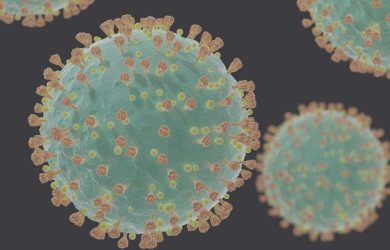
Emily Jordan writes in The Gates Scholar on her research on drug addiction and why Professor David Nutt's decision to speak up for science over ideology has inspired her own work.
Why do some people become addicts and others do not? In the UK about 6% of young people try cocaine. Despite the incredible addictive powers of the drug, only about 10% of these users become addicted. What determines who becomes an addict and who does not?
My research aims to understand why certain people are vulnerable to addiction and others are protected, even though both try drugs. Drugs of abuse mimic chemicals that naturally occur in the brain. These compounds act on the brain’s reward system, a system that is important for many normal human behaviours. In addiction, eventually drugs hijack these pathways and they become dysfunctional.
There are three main explanations for why only some people who try drugs become addicts while others do not. There could be something different about addicts’ brains, or there could be something different about their environment. Finally, there could be complex interactions between genes, environment and the brain that cause addiction to develop.
We already know that the first two explanations are true; there are brain differences that predict drug addiction (such as differential D2 receptor availability), and there are also environmental factors that make drug addiction more likely (such as social stress). These findings do not fully explain the gamut of drug addicts, so the third explanation is likely true as well.
Genes, environment and the brain must all interact in specific ways to produce addiction or to protect a person against addiction. For my PhD research I examine how social experiences influence brain function, making some individuals more likely to take drugs.
Ideally I want to discover bio-markers (genes or traits) that correlate with patterns of genes or specific environmental experiences that are conducive to addiction. These markers could then be used to identify the individuals with the highest risk for addiction. If doctors knew why certain people became addicted to drugs, they would have better targets for treating people who are already addicted and they would also be more able toprotect vulnerable individuals from trying drugs in the first place.
However, drug addiction is a complex issue and it is not simply rooted in science. While I can do my best to identify biomarkers that can be used to treat and prevent addiction, this research is useless unless policymakers take this information and apply it in a large-scale way to public health initiatives. This truth is one of the most fascinating and frustrating aspects of my research.
UK drug policy
I have found living in the UK very interesting, as the drug policies here are constantly under revision and I have witnessed some drastic changes even in my short time living in this country. The UK currently classifies drugs of abuse into 3 Classes: A, B or C, depending on their harm.
Harm is determined through ratings of physical, psychological and social harms that experts derive from scientific research. Punishment severity is meant to correspond to class, so that Class A includes the most harmful drugs and these also carry the harshest punishments.
For some drugs, this system works well. Heroin, in Class A, is extremely harmful, and carries tough penalties. For other drugs, the system makes little sense. For example, if you are caught with cannabis in the UK you face up to 5 years in prison or an unlimited fine (it is a Class B drug). Cannabis has little potential for addiction, and causes minimal harm to the body or brain. Nobody overdoses on marijuana.
In contrast, for the possession of ketamine, a Class C drug, you face up to 2 years in prison or an unlimited fine. Ketamine is quite addictive and causes considerable physical damage. It can induce lasting schizophrenic-like symptoms and also cause permanent bladder problems. Why then was ketamine put in Class C, while cannabis is in Class B?
While the Class system was developed so that drug policies could be scientifically based (a worthy goal), this is not what happened in practice. When the Home Office designed these laws, they created an advisory council of scientists to consult about the science of each drug. However, in many cases they did not listen to these expert opinions. Professor David Nutt, an addiction researcher and the chairman of the council, was actually fired by the government for speaking out against the fact that harmful drugs were being under classed and harmless drugs were being over classed.
If the goal of the law is to protect people from harming themselves or others, it is not living up to this standard.
Many people, especially teenagers and young adults, experiment with drugs but do not continue taking them. For these individuals, one bad decision can result in a lifetime of consequences, not due to drug toxicity (in most cases), but due to being seen as a criminal whenever they apply for work or school, meet potential partners, or try to secure safe housing. It is thus important to weigh both the potential harm caused by the drugs themselves against the potential harm of bringing users into the legal system in a scientific way when deciding how to punish people for possession. If we are not using scientific facts to make laws then the laws will be arbitrary and useless.
A fair policy
Creating a fair drug policy is a complex political, social and scientific issue, but by ignoring scientific research, the UK government may unfortunately be harming people more than helping. The current policies risk marring young people with criminal records who would otherwise outgrow their drug experimentation and contribute to society as normal, functioning adults.
These policies also fail to reflect the known harm levels of illegal drugs, and fail to take into account accepted scientific research. If the UK instead focused prosecution on only the most harmful drugs, then the resources that would be conserved could be diverted to targeting at-risk populations (identified through research like mine) for more specific drug prevention initiatives.
As a scientist, I see these issues as a crucial part of my work, even though they are outside the lab. Professor Nutt, who was sacked for his insistence on looking at scientific data is something of an inspiration. When he failed to make himself heard in government, he started an independent drug policy research group aimed at educating people based on facts. If every scientist made time in his or her research schedule to communicate with and advise policymakers, and was willing to risk disapproval in order to maintain scientifically-informed recommendations, the UK might have a chance at better, fairer and more effective drug laws.
*Emily Rose Jordan (USA, 2009) is doing a PhD Experimental Psychology. This article is published in the current edition of The Gates Scholar magazine. Picture credit: m_bartosch and www.freedigitalphotos.net.












